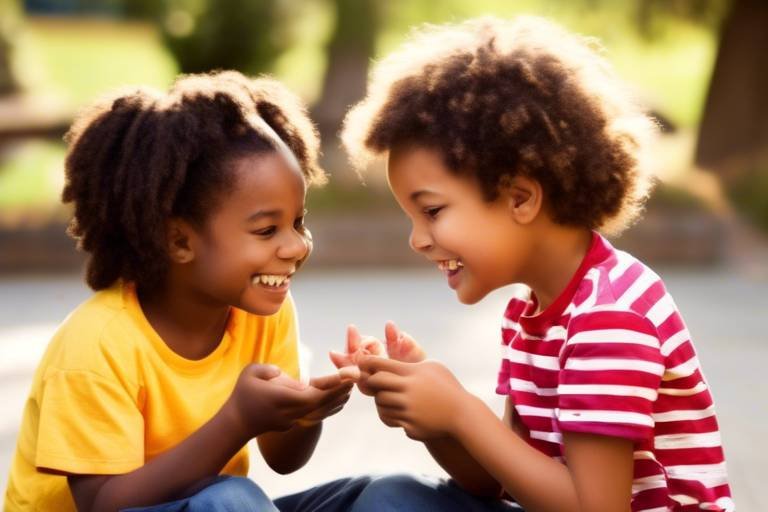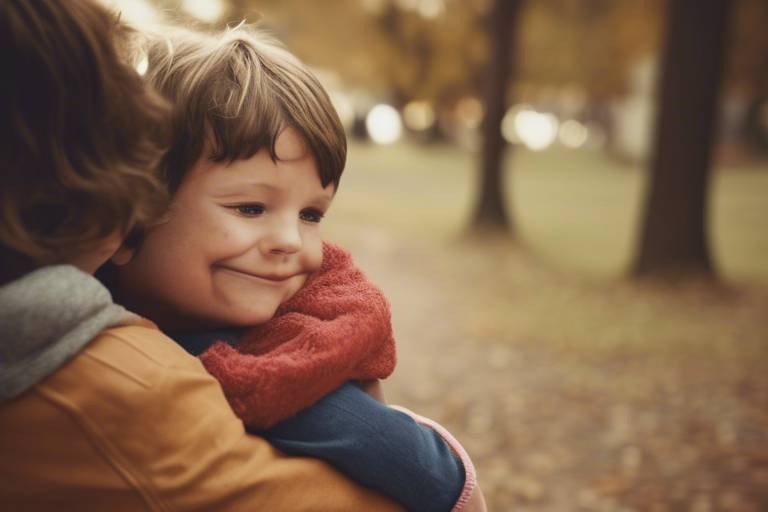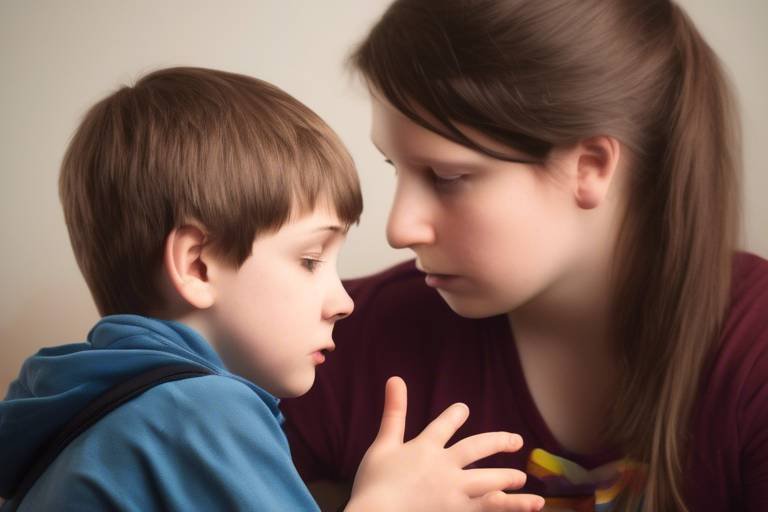Making New Friends: Tips for Kids and Parents
Making new friends can feel like a thrilling adventure, especially for kids. But let’s be honest—it can also be a bit daunting! As parents, we want our children to thrive socially, build lasting friendships, and navigate the sometimes tricky waters of social interactions. This article provides practical tips for both kids and parents on how to foster friendships, navigate social situations, and build lasting connections in various environments. So, whether your child is starting school, moving to a new neighborhood, or simply looking to expand their circle, these tips will help pave the way for meaningful relationships.
Friendships play a crucial role in a child's emotional and social development. Think of friendships as the building blocks of social skills! They help kids learn about empathy, cooperation, and communication. Understanding their significance helps parents encourage positive interactions and support their children in forming meaningful relationships. Kids who have friends often feel more secure and confident, which can lead to better performance in school and overall happiness. So, how can you help your child develop these essential connections? Let’s explore some strategies!
Teaching children essential social skills is vital for making friends. Just like learning to ride a bike, social skills take practice! This section covers strategies to help kids develop effective communication, empathy, and active listening skills to enhance their social interactions. The better they can express themselves and understand others, the more likely they are to connect with their peers. Here are some fun ways to encourage these skills:
Role-playing different social situations can empower children to practice their skills. Imagine your child as a superhero, ready to tackle any social challenge! This technique allows them to navigate various scenarios, building confidence and preparing them for real-life interactions with peers. For instance, you could set up a mock playdate where they practice asking someone to play or sharing toys. It’s all about creating a safe space for them to experiment and learn without the pressure of real-life consequences.
Learning how to introduce themselves and others is fundamental for kids. It’s like giving them a magic key to unlock new friendships! This subheading discusses fun ways to practice introductions, making socializing less intimidating and more enjoyable for children. You could create a game where they have to introduce a family member or even a stuffed animal. This playful approach can help them feel more comfortable when it comes time to meet new friends.
Rejection is a part of socializing, and it can sting! This section provides tips for parents on how to help children cope with rejection, fostering resilience and encouraging them to keep trying in their quest for friendship. Remind them that everyone experiences rejection at some point—it’s like a rite of passage! Encourage open conversations where they can express their feelings, and help them understand that it’s not a reflection of their worth. It’s important to teach them that every “no” is just a step toward finding the right friends.
Participating in group activities can facilitate friendships. Think of it as a social buffet where kids can sample different friendships! This subheading highlights various options, such as sports, clubs, and community events, that allow kids to meet new peers and bond over shared interests. Whether it’s joining a soccer team, participating in a book club, or attending local community events, these activities provide a fantastic platform for kids to connect with others who share their passions.
Confidence is key to making friends. It’s like the secret sauce that makes social interactions smoother! This section offers practical advice for parents on how to nurture their child's self-esteem, helping them feel more comfortable in social situations. Celebrate their unique qualities and encourage them to embrace who they are. When kids feel good about themselves, they are more likely to reach out and make connections with others.
Using positive reinforcement can significantly boost a child's confidence. It’s like giving them a high-five for their social efforts! This subheading explains how parents can celebrate small social successes to motivate their children to engage with others. Whether it’s acknowledging their bravery in speaking up during class or praising them for inviting a friend over, these little moments of recognition can go a long way in building their confidence.
It's essential for parents to set realistic expectations for their children's social experiences. Just like we can’t expect a flower to bloom overnight, friendships take time to grow! This section discusses how understanding individual personalities can help in navigating friendships effectively. Some kids are naturally outgoing, while others might be more reserved. By recognizing and respecting these differences, parents can better support their children in their social journeys.
- How can I help my child make friends at school?
Encourage them to participate in group activities and practice social skills at home. - What should I do if my child experiences rejection?
Talk openly about their feelings and remind them that rejection is a normal part of making friends. - How can I boost my child's confidence in social settings?
Use positive reinforcement and celebrate their social successes, no matter how small.

The Importance of Friendships
This article provides practical tips for both kids and parents on how to foster friendships, navigate social situations, and build lasting connections in various environments.
Friendships are not just a luxury; they are a necessity for a child's emotional and social development. Imagine a world where everyone is isolated—no laughter, no shared secrets, and no support during tough times. Friendships provide a safety net, helping children learn about trust, empathy, and cooperation. When kids have friends, they experience a sense of belonging that is vital for their self-esteem and overall happiness.
Research shows that children with strong friendships tend to have better mental health, improved academic performance, and enhanced social skills. The significance of friendships extends beyond childhood; the lessons learned in these early relationships often shape how children interact with others throughout their lives. So, how can parents encourage their children to build these essential connections? Understanding the importance of friendships is the first step.
In addition to emotional benefits, friendships also teach valuable life skills. For instance, through interactions with peers, children learn to navigate conflicts, share resources, and communicate effectively. These skills are not just important in childhood; they will carry over into adulthood, impacting their professional and personal relationships. Here are some key reasons why friendships matter:
- Emotional Support: Friends provide comfort during difficult times, helping kids cope with challenges.
- Social Skills Development: Engaging with peers fosters essential communication and interpersonal skills.
- Boosting Self-Esteem: Positive interactions with friends can enhance a child's self-worth and confidence.
- Learning Empathy: Friendships teach children to understand and care for others' feelings.
As parents, it's crucial to recognize the role you play in helping your child form friendships. By creating opportunities for social interactions, whether through playdates, school activities, or community events, you can set the stage for meaningful connections. Remember, friendships are a two-way street. Encourage your child to be a good friend by modeling positive behaviors such as kindness, active listening, and respect for others.
In summary, friendships are the building blocks of social development for children. They teach essential life skills, provide emotional support, and help kids build a strong sense of self. As parents, fostering these relationships can lead to lifelong benefits for your child, equipping them with the tools they need to thrive in an increasingly interconnected world.
Q: How can I help my child make friends?
A: Encourage social activities, teach them communication skills, and provide opportunities for interaction with peers.
Q: What should I do if my child is struggling to make friends?
A: Be supportive, listen to their concerns, and consider arranging playdates or enrolling them in group activities to help them connect with others.
Q: How can I teach my child to handle rejection?
A: Discuss the importance of resilience, share personal experiences, and encourage them to keep trying while reminding them that rejection is a normal part of socializing.

Encouraging Social Skills
Teaching children essential social skills is vital for making friends. Just like learning to ride a bike, these skills take practice and patience. When kids are equipped with the right tools, they can navigate social situations with ease and confidence. One of the most important skills to develop is effective communication. This means not only knowing how to speak clearly but also understanding non-verbal cues, like body language and facial expressions. For instance, a friendly smile or an open posture can make a world of difference in how approachable a child appears to others.
Another crucial aspect is empathy. Helping children understand and relate to the feelings of their peers can foster deeper connections. You might ask your child questions like, "How do you think your friend felt when that happened?" This encourages them to think beyond themselves and consider others' perspectives. Active listening is also a key component of social interaction. It’s not just about hearing words; it’s about being engaged in the conversation. Encourage your child to show interest by asking follow-up questions or nodding along to show they are paying attention.
To make learning these skills more enjoyable, consider using role-playing scenarios. This technique allows children to practice their social skills in a fun and safe environment. For example, you can set up a situation where they have to introduce themselves to a new friend or resolve a conflict. By acting out these scenarios, they can build confidence and prepare for real-life interactions with peers. It’s like rehearsing for a play; the more they practice, the more natural it will feel when it’s time for the real performance!
Learning how to introduce themselves and others is fundamental for kids. You can make this practice enjoyable by turning it into a game. For instance, during family gatherings or playdates, encourage your child to introduce themselves to new people. You could even create a fun "introduction card" that they can fill out with their name, favorite color, and a fun fact about themselves. This not only makes introductions less intimidating but also gives them a conversation starter!
Rejection is a part of socializing, and it can be tough for kids to handle. As a parent, it's important to equip them with the tools to cope with these feelings. Start by having open conversations about rejection, explaining that everyone experiences it at some point. Share stories from your own life where you faced rejection but learned something valuable from it. This helps normalize their feelings and shows them that it’s okay to feel hurt. Encourage them to express their emotions and remind them that each experience is a stepping stone to finding true friends. Reinforce the idea that persistence is key; just because one interaction didn’t go well doesn’t mean they should stop trying.
In conclusion, encouraging social skills in children is not just about teaching them how to interact with peers; it's about helping them build a foundation for lasting friendships. By focusing on effective communication, empathy, and resilience, parents can empower their children to navigate social situations with confidence and ease.
- What are some signs my child needs help with social skills? Look for signs like difficulty making friends, avoiding social situations, or expressing anxiety about interactions.
- How can I encourage my child to practice social skills at home? Set up playdates, family gatherings, or role-playing scenarios where they can practice introductions and conversations.
- What should I do if my child faces rejection? Talk openly about their feelings, share your own experiences, and encourage them to keep trying while reinforcing their self-worth.

Role-Playing Scenarios
Role-playing is an incredibly effective way for children to practice their social skills in a fun and engaging manner. Imagine your child stepping into different roles, like a little actor on a stage, exploring various social situations without the pressure of real-life consequences. This approach not only builds confidence but also equips them with the tools they need to navigate the often tricky waters of friendship. By simulating different scenarios, kids can learn how to introduce themselves, ask questions, and respond to others, all while feeling safe and supported.
For instance, you can create a mini theater at home where you and your child take turns playing different characters. One day, you could be the new kid at school, and your child can practice welcoming you and asking questions to get to know you better. This can lead to discussions about what makes a good friend and how to engage in conversations. You might even consider using props or costumes to make the experience more enjoyable and immersive.
Here are some common role-playing scenarios you might want to try:
- Meeting New Friends: Practice how to approach someone new and start a conversation.
- Joining a Group: Simulate the experience of joining a game or activity with other kids.
- Handling Conflict: Role-play a situation where there is a disagreement and practice resolving it peacefully.
These scenarios can be tailored to your child’s age and comfort level, making the practice both relevant and effective. Encourage your child to express their feelings and thoughts during these exercises, as this can lead to deeper insights into their social interactions. The more they practice, the more natural these interactions will feel, turning what might initially seem daunting into something they look forward to.
Additionally, role-playing can help children understand the importance of empathy. By stepping into someone else's shoes, they can learn to appreciate different perspectives and feelings, which is crucial for forming strong friendships. It’s like giving them a magic lens through which they can see the world of social interactions more clearly, allowing them to navigate friendships with greater ease.
Remember, the goal is to make these role-playing sessions enjoyable and pressure-free. Celebrate their efforts and progress, no matter how small. This will not only boost their confidence but also reinforce the idea that making friends is a fun and rewarding journey. So, gather your props, unleash your creativity, and watch as your child transforms into a social butterfly, ready to take on the world!
Q: How often should we practice role-playing scenarios?
A: It's great to incorporate role-playing into your routine. Aim for at least once a week, but feel free to do it more often if your child enjoys it!
Q: What if my child is shy and doesn't want to participate?
A: Start small! You can begin with just the two of you and gradually introduce more complex scenarios as they become more comfortable. Encouragement and patience are key.
Q: Can role-playing help with other areas of my child's life?
A: Absolutely! The skills learned through role-playing can benefit your child in various situations, including school presentations and family gatherings.

Practicing Introductions
When it comes to making new friends, introductions are like the opening act of a concert; they set the stage for everything that follows. Teaching children how to introduce themselves and others can make a world of difference in their social interactions. But how can we make this learning process fun and engaging? Imagine turning practice into a game, where kids can feel less pressure and more excitement about meeting new people!
One effective way to practice introductions is through role-playing. You can set up scenarios at home where your child can pretend to meet new friends. For instance, you could take turns being the "new kid" and the "current friend." This not only helps them learn how to introduce themselves but also allows them to practice responding to others. A simple structure can be followed: say your name, share something interesting about yourself, and ask a question to keep the conversation flowing. Here’s a quick example:
| Step | Example |
|---|---|
| 1. State your name | “Hi, I’m Alex!” |
| 2. Share an interest | “I love playing soccer.” |
| 3. Ask a question | “What’s your favorite sport?” |
By incorporating fun elements into these practices, like using props or creating a mini stage, you can transform a potentially nerve-wracking experience into a delightful one. Kids will learn to associate introductions with positive feelings, making them more likely to engage when they meet someone new.
Another great way to practice is through family gatherings or playdates. Encourage your child to introduce you to their friends and vice versa. This not only helps them practice but also shows them how to facilitate connections between others. You might say, “Can you introduce me to your friend Sarah?” This prompts them to take the lead and reinforces their confidence.
Lastly, remind your child that everyone feels a little shy at times. It’s perfectly normal! You can share stories of your own experiences when you were their age, highlighting how you overcame your fears. This connection can help them feel more at ease and less alone in their journey to make friends.
In summary, practicing introductions is a vital skill that can be developed through fun and engaging activities. By role-playing, utilizing real-life situations, and sharing personal stories, you can help your child feel more confident and prepared to meet new friends. Remember, the more they practice, the easier it will become!

Handling Rejection
Rejection can feel like a punch to the gut, especially for kids who are just starting to navigate the complex world of friendships. It’s essential for both parents and children to understand that rejection is a normal part of life and not a reflection of their worth. When a child faces rejection, it can be disheartening, but it also presents a valuable opportunity for growth and resilience. As parents, your role is to help them process these feelings and learn how to bounce back stronger.
First and foremost, it's important to validate your child's feelings. If they come home upset because a friend didn’t invite them to a party, acknowledge their feelings by saying something like, “I can see that you’re really disappointed. It’s okay to feel that way.” This simple act of recognition can help them feel understood and less alone in their experience.
Next, encourage open communication. Ask your child how they felt about the situation and what they think they could do differently in the future. This not only helps them articulate their feelings but also empowers them to think critically about social interactions. You might suggest role-playing different scenarios where they could practice handling rejection. For example, they could pretend to approach a group of kids and practice how to respond if they are not welcomed. This can turn a painful experience into a learning opportunity.
Additionally, remind your child that everyone experiences rejection at some point. Sharing your own experiences can help normalize their feelings. You might say, “When I was your age, I faced rejection too. I remember feeling sad, but I learned that it’s just a part of making friends.” This analogy helps them see that rejection is a universal experience, making it less daunting.
Moreover, it’s crucial to foster resilience. Talk to your child about the importance of perseverance. Encourage them to keep trying to make new friends, even if it doesn’t always work out. You can use positive affirmations to reinforce this idea. Phrases like “You are brave for trying” or “Every experience helps you grow” can instill a sense of courage in your child.
Here’s a little tip: create a “rejection toolkit” together. This could include strategies like taking deep breaths, engaging in a favorite hobby, or writing down their feelings. Having a go-to list of coping mechanisms can empower them to handle rejection more effectively when it arises.
Finally, remind your child that while rejection can hurt, it often leads to new opportunities. Encourage them to join clubs, sports teams, or other activities where they can meet new people. With every new interaction, they’ll have the chance to build connections and strengthen their social skills. Remember, every “no” brings them one step closer to a “yes.”
In conclusion, handling rejection is a skill that can be cultivated over time. By providing support, encouraging open dialogue, and fostering resilience, you can help your child navigate these tricky waters with confidence and grace. After all, friendships are about quality, not quantity, and every experience is a stepping stone to finding those lasting connections.
- How can I help my child cope with rejection?
Start by validating their feelings and encouraging open communication. Share your own experiences with rejection to normalize their feelings and foster resilience.
- What are some strategies to build my child's confidence?
Use positive reinforcement, celebrate small victories, and encourage participation in group activities to help them feel more comfortable in social situations.
- Is rejection a normal part of childhood?
Yes, rejection is a common experience for children as they develop social skills and navigate friendships. It’s important to teach them how to handle it constructively.

Encouraging Group Activities
Participating in group activities can be a fantastic way for kids to make new friends and bond over shared interests. Think of it as a vibrant tapestry where each thread represents a unique personality, weaving together to create something beautiful. When children engage in activities with peers, they not only learn how to work as a team but also discover the joy of collaboration and camaraderie. So, how can parents encourage their kids to dive into these social waters? Let's explore some engaging options!
First off, consider enrolling your child in sports teams. Whether it's soccer, basketball, or swimming, team sports are a great way for kids to meet others while learning the importance of teamwork and discipline. The thrill of scoring a goal or cheering for a teammate can create lasting bonds that extend beyond the playing field. Plus, the shared experience of both victories and defeats can help children develop resilience and empathy towards others.
In addition to sports, clubs can also serve as fantastic platforms for social interaction. Think about activities like art clubs, science clubs, or even coding classes. These environments allow children to explore their passions while connecting with like-minded peers. For instance, a child who loves painting might find joy in a local art class, where they can share ideas and techniques with fellow young artists. This not only nurtures their creativity but also fosters friendships built on common interests.
Community events are another excellent opportunity for kids to interact with others outside their usual circles. Festivals, fairs, or even neighborhood clean-up days can be fun and engaging ways for children to meet new friends. Imagine your child participating in a local festival, where they can enjoy games, food, and activities while mingling with other kids. Such experiences can be memorable and provide a sense of belonging in the community.
For parents looking to facilitate friendships, it might also be beneficial to organize playdates or group outings. Inviting a few friends over for a movie night or a trip to the park can create a relaxed atmosphere for kids to bond. During these informal gatherings, children can engage in various activities, from playing games to simply chatting, which helps them develop their social skills in a comfortable setting.
In conclusion, encouraging group activities is a powerful way to help children build friendships. By providing them with opportunities to engage in sports, clubs, community events, and playdates, parents can create an enriching environment where social connections can flourish. Just remember, every interaction is a stepping stone towards building lasting relationships!
- What types of group activities are best for shy children?
Activities that involve less competition, such as art classes or book clubs, can be ideal for shy kids as they focus more on collaboration than competition. - How can I help my child if they struggle to make friends during group activities?
Encourage them to take small steps, like initiating conversations or finding a buddy to join them. Positive reinforcement can also help boost their confidence. - Are there any online group activities that can help my child make friends?
Yes! Many platforms offer virtual clubs and classes, such as coding boot camps or online gaming communities, where kids can connect with peers worldwide. - How do I know if my child is ready for group activities?
Look for signs of interest in socializing, such as asking about friends or expressing a desire to join teams or clubs. Start with small, manageable groups to gauge their comfort level.

Building Confidence in Social Settings
Confidence is the secret sauce when it comes to making friends. Think of it as the magic ingredient that transforms an awkward encounter into a smooth conversation. When children feel confident, they are more likely to engage with their peers, share their thoughts, and express themselves freely. But how can parents help their kids build this crucial confidence? Here are some practical tips that can make a world of difference.
First, it's important for parents to create a safe and supportive environment. Children need to feel that they can express themselves without fear of judgment. This means encouraging them to share their feelings, thoughts, and even their fears. When kids know that their parents are there to listen and support them, they are more likely to take social risks, like approaching a new friend on the playground or speaking up in class.
Another effective method is through positive reinforcement. Celebrate those small victories! Did your child say hello to a classmate? Give them a high-five! Did they join a new group activity? Throw a mini celebration! These moments of recognition not only boost their self-esteem but also reinforce the idea that social interactions are rewarding. It’s like planting seeds of confidence that can grow into a garden of friendships.
Moreover, parents can help their children set realistic expectations for social interactions. Not every attempt to make friends will be successful, and that's completely normal. Teach your child that it's okay to feel nervous and that everyone experiences rejection at some point. By understanding that friendships take time to develop, kids can approach social situations with a healthier mindset. This understanding can transform what might seem like a daunting task into an exciting adventure.
Additionally, consider practicing social scenarios at home. Role-playing can be a fun way to prepare kids for real-life interactions. For instance, you can set up a mock scenario where your child has to introduce themselves to a new friend. This not only gives them a chance to practice but also allows them to explore different ways to start conversations. The more they practice, the more comfortable they'll feel when the moment arises in real life.
Lastly, it’s essential for parents to model confident behavior. Children learn a lot from observing their parents. When they see you engaging with others confidently—whether it’s striking up a conversation with a neighbor or handling a tricky social situation—they’ll be more likely to mimic that behavior. Remember, you are their biggest role model!
- How can I tell if my child is struggling with social confidence? Look for signs such as reluctance to participate in group activities, avoiding eye contact, or expressing anxiety about social situations.
- What are some activities that can help build my child's confidence? Encourage participation in team sports, drama clubs, or community service projects where they can interact with peers.
- How can I help my child cope with social rejection? Teach them to view rejection as a learning experience and encourage them to try again, emphasizing that not every interaction will lead to a friendship.

Positive Reinforcement
When it comes to helping your child make new friends, can be a game changer. Think of it as a cheerleader in your child's social life! By celebrating their small victories, you’re not just boosting their confidence; you’re also teaching them that social interactions can be rewarding and fun. So, how can you effectively implement positive reinforcement in your child’s journey to make friends?
First off, it’s essential to recognize the moments when your child takes a step outside their comfort zone. Did they say hello to a classmate? Maybe they shared their toys during playtime? These are the moments worth celebrating! A simple “I’m so proud of you for talking to your friend today!” can make a world of difference. It’s like planting seeds of confidence that will grow over time.
Furthermore, you can use tangible rewards to reinforce positive behaviors. For instance, after a successful playdate or a good interaction at school, consider treating them to a fun activity, like going to the park or having ice cream. This doesn’t mean you have to bribe them for every little thing, but occasional rewards can create a positive association with social interactions, making them more likely to seek out friendships in the future.
Another effective strategy is to create a “Friendship Journal” together. In this journal, your child can jot down their experiences, what went well, and what they enjoyed during their social interactions. This not only encourages reflection but also provides a tangible way to see their progress over time. You can even add stickers or drawings to make it more engaging!
It's also crucial to model positive reinforcement in your interactions. When your child sees you acknowledging and celebrating others’ achievements, they learn the importance of recognizing good behavior in their peers. This can foster a culture of encouragement, where they feel empowered to uplift their friends as well.
Lastly, remember that consistency is key. Make it a habit to regularly acknowledge your child’s efforts in making friends. Over time, this will help them build a strong foundation of self-esteem, making socializing feel less daunting. So, let’s cheer them on and watch them flourish in their social endeavors!
- What is positive reinforcement? Positive reinforcement is a technique used to encourage desired behaviors by rewarding them, which can boost confidence and motivation.
- How can I encourage my child to socialize more? Engage your child in group activities, role-play social scenarios, and provide positive feedback to help them feel more comfortable.
- Is it okay to reward my child for making friends? Yes, as long as the rewards are occasional and not seen as bribes, they can help create positive associations with socializing.

Setting Realistic Expectations
When it comes to making new friends, setting realistic expectations is crucial for both kids and parents. It’s easy to get caught up in the excitement of new social opportunities, but having a clear understanding of what to expect can prevent disappointment and frustration. Remember, friendships don’t always form overnight; they take time to develop, just like a beautiful garden needs time to bloom.
Parents should recognize that each child is unique, with their own personality traits and social preferences. For instance, while some kids may thrive in large groups, others might feel overwhelmed and prefer one-on-one interactions. Understanding these differences can help parents guide their children through the social landscape with empathy and support. Here are a few key points to keep in mind:
- Individual Differences: Not every child will make friends in the same way. Some might need more time to warm up to others, while others may dive right in.
- Quality Over Quantity: It’s not about how many friends a child has, but rather the quality of those friendships. A few close friends can provide more emotional support than a large group of acquaintances.
- Social Skills Development: Kids are constantly learning and developing their social skills. Expecting them to be perfect right away can lead to unnecessary pressure.
Encouraging children to embrace their individuality can also lead to more authentic friendships. For instance, if a child loves reading, joining a book club can help them connect with like-minded peers. On the other hand, if a child is more athletic, participating in sports can provide a natural setting for forming bonds. It’s all about finding the right environment that suits their interests.
Additionally, parents should help their children understand that rejection is a normal part of socializing. Just like in any relationship, not every interaction will lead to a lasting friendship. By preparing children for this reality, parents can foster resilience and encourage their kids to keep trying. Remember, every “no” can lead to a “yes” down the line!
In conclusion, setting realistic expectations is about balancing hope with reality. By understanding their child’s unique personality and social needs, parents can create a supportive environment where friendships can flourish naturally. After all, the journey of making friends is just as important as the friendships themselves!
Q: How can I help my child if they are shy?
A: Encourage gradual exposure to social situations and celebrate small successes. You can also role-play different scenarios at home to build their confidence.
Q: What should I do if my child experiences rejection?
A: Help them process their feelings and remind them that rejection is a normal part of life. Encourage them to learn from the experience and keep trying.
Q: How do I know if my child is ready for group activities?
A: Look for signs of interest in socializing, such as wanting to play with others or asking to join clubs. Start with smaller groups to ease them into the experience.
Frequently Asked Questions
- Why are friendships important for kids?
Friendships are crucial for children's emotional and social development. They provide a sense of belonging, boost self-esteem, and help kids learn essential life skills such as empathy and cooperation. Having friends can make experiences more enjoyable and help children navigate challenges together.
- How can parents encourage their children to make friends?
Parents can encourage their children to make friends by providing opportunities for social interactions, such as enrolling them in sports, clubs, or community events. Teaching social skills, like effective communication and active listening, also plays a vital role. Role-playing different scenarios can help kids practice these skills in a fun and relaxed environment.
- What should I do if my child faces rejection?
Rejection is a normal part of socializing, and it's important for parents to help their children cope with it. Encourage them to express their feelings and reassure them that it's okay to feel upset. Teach them resilience by discussing ways to move forward and remind them that every experience is a chance to learn and grow.
- How can I help my child build confidence in social settings?
Building confidence starts with positive reinforcement. Celebrate your child's small social successes, whether it's making a new friend or speaking up in a group. Setting realistic expectations and understanding your child's unique personality can also help them feel more comfortable and less pressured in social situations.
- What are some fun ways to practice introductions with my child?
Practicing introductions can be made fun through games and role-playing. For example, you can create a 'meet and greet' game where your child practices introducing themselves and others. You could also set up playdates where they can practice these skills in a relaxed environment, making it less intimidating.
- Are group activities effective for making friends?
Absolutely! Group activities provide a fantastic platform for kids to meet peers and bond over shared interests. Whether it's joining a sports team, participating in art classes, or attending community events, these settings encourage teamwork and friendship-building in a natural and enjoyable way.



















